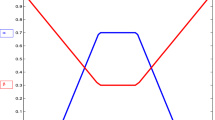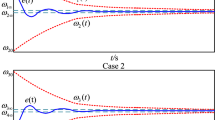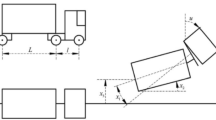Abstract
Because of coupling, nonlinearity, and uncertainty in a municipal solid waste incineration (MSWI) process, a suitable multivariable controller is difficult to establish under strong disturbance. Additionally, the problems of reducing mechanical wear and energy consumption in the control process should also be considered. To solve these problems, an event-triggered fuzzy neural multivariable controller is proposed in this paper. First, the MSWI object model based on the multiinput multioutput Takagi-Sugeno fuzzy neural network is established using a data-driven method. Second, a fuzzy neural multivariable controller is designed to control the furnace temperature and flue gas oxygen content synchronously under external disturbance. Third, an event-triggered mechanism is constructed to update the control rate online while ensuring control effects. Then, the stability of the proposed control strategy is proven through the Lyapunov II theorem to guide its practical application. Finally, the effectiveness of the controller is verified using the real industrial data of an MSWI factory in Beijing, China. The experimental results show that the proposed control strategy greatly improves the control efficiency, reduces energy consumption by 66.23%, and improves the multivariable tracking control accuracy.
Similar content being viewed by others
References
Wang P J, Yan F, Xie F, et al. The co-removal of PCDD/Fs by SCR system in a full-scale municipal solid waste incinerator: Migration-transformation and decomposition pathways. Sci China Tech Sci, 2022, 65: 2429–2441
Sun J, Meng X, Qiao J. Prediction of oxygen content using weighted PCA and improved LSTM network in MSWI process. IEEE Trans Instrum Meas, 2021, 70: 1–12
Lu G, Wang Y B, Xu H X, et al. Deep multimodal learning for municipal solid waste sorting. Sci China Tech Sci, 2022, 65: 324–335
Kaza S, Yao L, Bhada-Tata P, et al. What a waste 2.0: A global snapshot of solid waste management to 2050. World Bank Group, 2018
Korai M S, Mahar R B, Uqaili M A. The feasibility of municipal solid waste for energy generation and its existing management practices in Pakistan. Renew Sustain Energy Rev, 2017, 72: 338–353
Wu H F, Zhang B W, Qu W J, et al. Integration of a thermochemical energy system driven by solar energy and biomass for natural gas and power production. Sci China Tech Sci, 2022, 65: 1383–1395
Kalyani K A, Pandey K K. Waste to energy status in India: A short review. Renew Sustain Energy Rev, 2014, 31: 113–120
Chen D Z, Christensen T H. Life-cycle assessment (EASEWASTE) of two municipal solid waste incineration technologies in China. Waste Manag Res, 2010, 28: 508–519
Li J, Xu R, Wang G, et al. Study on the feasibility and co-combustion mechanism of mixed injection of biomass hydrochar and anthracite in blast furnace. Fuel, 2021, 304: 121465
Zhuang J, Tang J, Aljerf L. Comprehensive review on mechanism analysis and numerical simulation of municipal solid waste incineration process based on mechanical grate. Fuel, 2022, 320: 123826
Suntivarakorn R, Treedet W. Improvement of Boiler’s efficiency using heat recovery and automatic combustion control system. Energy Procedia, 2016, 100: 193–197
Calbry-Muzyka A, Madi H, Rüsch-Pfund F, et al. Biogas composition from agricultural sources and organic fraction of municipal solid waste. Renew Energy, 2022, 181: 1000–1007
Sun R, Ismail T M, Ren X, et al. Numerical and experimental studies on effects of moisture content on combustion characteristics of simulated municipal solid wastes in a fixed bed. Waste Manage, 2015, 39: 166–178
Wang H, Gui H, Ren C, et al. Factors influencing urban residents’ intention of garbage sorting in china: An extended TPB by Integrating expectancy theory and norm activation model. Sustainability, 2021, 13: 12985
Ding H X, Tang J, Qiao J F. Control methods of municipal solid wastes incineration process: A survey. In: Proceedings of the 2021 40th Chinese Contr Confer (CCC). Shanghai, IEEE, 2021. 662–667
Meng X, Tang J, Qiao J. NOx emissions prediction with a brain-inspired modular neural network in municipal solid waste incineration processes. IEEE Trans Ind Inf, 2022, 18: 4622–4631
Han Z Z, Huang Y Z, Li J, et al. A hybrid deep neural network based prediction of 300 MW coal-fired boiler combustion operation condition. Sci China Tech Sci, 2021, 64: 2300–2311
Shi Y, Li L, Yang J, et al. Center-based transfer feature learning with classifier adaptation for surface defect recognition. Mech Syst Signal Process, 2023, 188: 110001
Yue C F, Lin T, Zhang X, et al. Hierarchical path planning for multiarm spacecraft with general translational and rotational locomotion mode. Sci China Tech Sci, 2023, 66: 1180–1191
Xie Y B, Wang D, Qiao J F. Dynamic multi-objective intelligent optimal control toward wastewater treatment processes. Sci China Tech Sci, 2022, 65: 569–580
Said Saab S, Hauser M, Ray A, et al. Multivariable nonadaptive controller design. IEEE Trans Ind Electron, 2021, 68: 6181–6191
Zhao D, Li F, Ma R, et al. An unknown input nonlinear observer based fractional order PID control of fuel cell air supply system. IEEE Trans Ind Applicat, 2020, 56: 5523–5532
Wang Y, Wang Z, Zou L, et al. Multiloop decentralized H∞ fuzzy PID-Like control for discrete time-delayed fuzzy systems under dynamical Event-Triggered schemes. IEEE Trans Cybern, 2022, 52: 7931–7943
Çetin G, Özkaraca O, Keçebaş A. Development of PID based control strategy in maximum exergy efficiency of a geothermal power plant. Renew Sustain Energy Rev, 2021, 137: 110623
Ashida Y, Wakitani S, Yamamoto T. Design of an augmented output-based multiloop self-tuning PID control system. Ind Eng Chem Res, 2019, 58: 11474–11484
Arruda L V R, Swiech M C S, Neves-Jr F, et al. Um método evolucionário para sintonia de controladores PI/PID em processos multivariáveis. Sba Controle Automação, 2008, 19: 1–17
Han H G, Zhang J C, Du S L, et al. Robust optimal control for anaerobic-anoxic-oxic reactors. Sci China Tech Sci, 2021, 64: 1485–1499
Han H G, Wang T, Sun H Y, et al. Fuzzy super-twisting sliding mode control for municipal wastewater nitrification process. Sci China Tech Sci, 2022, 65: 2420–2428
Qiao J F, Hou Y, Zhang L, et al. Adaptive fuzzy neural network control of wastewater treatment process with multiobjective operation. Neurocomputing, 2018, 275: 383–393
Han H G, Zhang L, Liu H X, et al. Multiobjective design of fuzzy neural network controller for wastewater treatment process. Appl Soft Comput, 2018, 67: 467–478
Dai W, Chai T, Yang S X. Data-driven optimization control for safety operation of hematite grinding process. IEEE Trans Ind Electron, 2015, 62: 2930–2941
Wang B, Huang J, Wen C, et al. Event-triggered model predictive control for power converters. IEEE Trans Ind Electron, 2021, 68: 715–720
Sun Z, Dai L, Xia Y, et al. Event-based model predictive tracking control of nonholonomic systems with coupled input constraint and bounded disturbances. IEEE Trans Automat Contr, 2018, 63: 608–615
Du S L, Liu T, Ho D W C. Dynamic event-triggered control for leader-following consensus of multiagent systems. IEEE Trans Syst Man Cybern Syst, 2020, 50: 3243–3251
Gao H, Song Y, Wen C. Event-triggered adaptive neural network controller for uncertain nonlinear system. Inf Sci, 2020, 506: 148–160
Wu L B, Park J H, Xie X P, et al. Neural network adaptive tracking control of uncertain MIMO nonlinear systems with output constraints and event-triggered inputs. IEEE Trans Neural Netw Learn Syst, 2021, 32: 695–707
Li S, Ahn C K, Guo J, et al. Neural-network approximation-based adaptive periodic event-triggered output-feedback control of switched nonlinear systems. IEEE Trans Cybern, 2021, 51: 4011–4020
Malinauskaite J, Jouhara H, Czajczyńska D, et al. Municipal solid waste management and waste-to-energy in the context of a circular economy and energy recycling in Europe. Energy, 2017, 141: 2013–2044
Yan M, Antoni M, Wang J, et al. Numerical investigation of MSW combustion influenced by air preheating in a full-scale moving grate incinerator. Fuel, 2021, 285: 119193
Ding H, Tang J, Qiao J. MIMO modeling and multi-loop control based on neural network for municipal solid waste incineration. Control Eng Pract, 2022, 127: 105280
Author information
Authors and Affiliations
Corresponding author
Additional information
This work was supported by the Science and Technology Innovation 2030-“New Generation Artificial Intelligence” Major Project of China (Grant No. 2021ZD0112300), the Innovative Research Group Project of the National Natural Science Foundation of China (Grant No. 62021003), the National Natural Science Foundation of China (Grant No. 62073006), and the Natural Science Foundation of Beijing (Grant Nos. 4212032 and 4192009).
Rights and permissions
About this article
Cite this article
Ding, H., Qiao, J., Huang, W. et al. Event-triggered fuzzy neural multivariable control for a municipal solid waste incineration process. Sci. China Technol. Sci. 66, 3115–3128 (2023). https://doi.org/10.1007/s11431-022-2294-3
Received:
Accepted:
Published:
Issue Date:
DOI: https://doi.org/10.1007/s11431-022-2294-3




